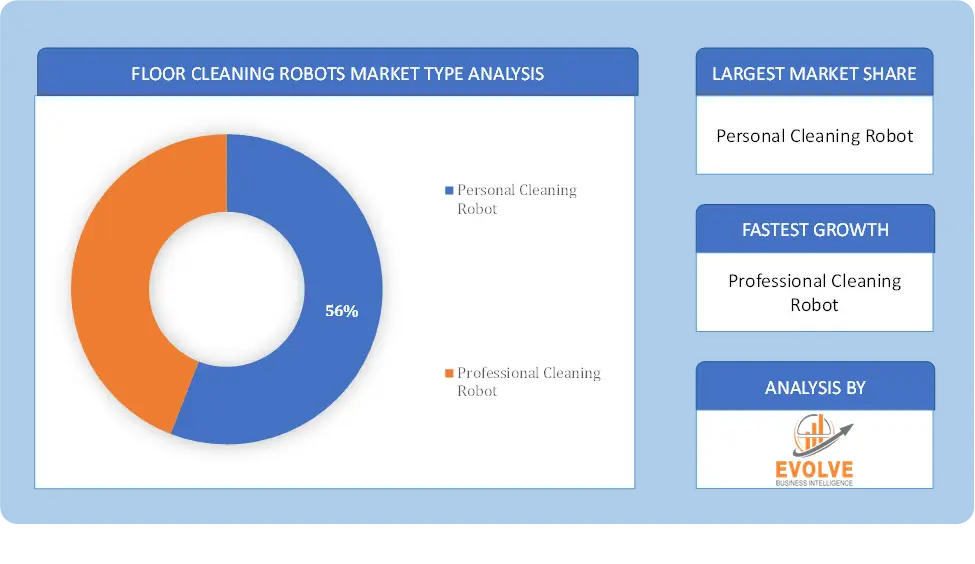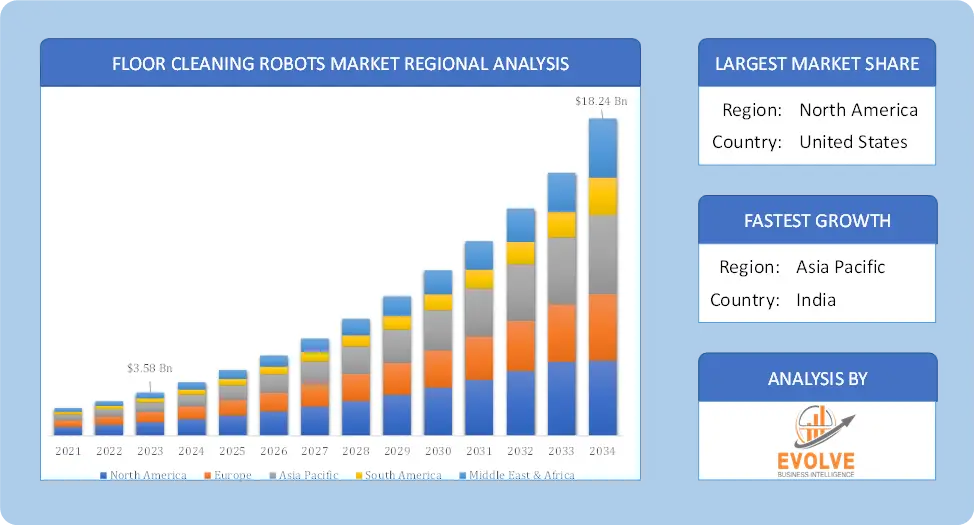Floor Cleaning Robots Market Analysis and Global Forecast 2021-2034
$ 1,390.00 – $ 5,520.00Price range: $ 1,390.00 through $ 5,520.00
Floor Cleaning Robots Market Research Report: Information By Type (Frozen Ready Meals, Frozen Seafood, Frozen Meat And Poultry, Frozen Fruit And Vegetables, Frozen Potatoes, Frozen Soups), By Application (Food Service Industry, Retail Users), and by Region — Forecast till 2034
Page: 144
Floor Cleaning Robots Market Overview
The Floor Cleaning Robots Market Size is expected to reach USD 18.24 Billion by 2034. The Floor Cleaning Robots Market industry size accounted for USD 3.58 Billion in 2023 and is expected to expand at a compound annual growth rate (CAGR) of 15.24% from 2021 to 2034. Floor cleaning robots are autonomous devices designed to clean various types of flooring, such as tiles, hardwood, and carpets. Equipped with sensors, cameras, and advanced algorithms, they navigate around obstacles, map out the environment, and perform cleaning tasks without human intervention. These robots typically offer features like vacuuming, sweeping, mopping, and even self-charging, making them convenient for maintaining cleanliness in homes and commercial spaces. Some models also connect to smartphones, allowing users to schedule cleanings and monitor progress remotely.
Global Floor Cleaning Robots Market Synopsis
The COVID-19 pandemic has led to supply chain disruptions leading to supply shortages or lower demand in the Floor Cleaning Robots market. The travel restrictions and social-distancing measures have resulted in a sharp drop in consumer and business spending and this pattern is to continue for some time. The end-user trend and preferences have changed due to the pandemic and have resulted in manufacturers, developers, and service providers to adopt various strategies to stabilize the company.
Floor Cleaning Robots Market Dynamics
The major factors that have impacted the growth of Floor Cleaning Robots are as follows:
Drivers:
Ø Technological Advancements
Advances in robotics technology, including improved sensors, artificial intelligence, machine learning, and enhanced mapping capabilities, have significantly improved the functionality and efficiency of floor cleaning robots. These advancements have made robots more effective at navigating complex environments and performing thorough cleanings, boosting consumer confidence and adoption rates.
Restraint:
- Data Privacy and Security Concerns
As floor cleaning robots become more connected and integrated into smart home ecosystems, concerns about data privacy and security have emerged. These devices often use cameras and sensors to map out a home, raising questions about how this data is stored, used, and protected. Potential security vulnerabilities could expose users to risks, leading to hesitation in adopting these technologies, particularly among privacy-conscious consumers.
Opportunity:
⮚ Development of Multifunctional Robots
There is a growing demand for multifunctional floor cleaning robots that can perform a variety of tasks beyond just vacuuming or mopping. The development of robots that can handle additional chores, such as air purification, dusting, or even carpet shampooing, presents a significant opportunity. By offering an all-in-one solution for household cleaning, manufacturers can increase the appeal of these robots to consumers looking for comprehensive home automation solutions.
Floor Cleaning Robots Segment Overview
By Type
 Based on Type, the market is segmented based on Personal Cleaning Robot, Professional Cleaning Robot. The personal cleaning robot segment dominates the floor cleaning robots market, primarily due to the widespread adoption of these devices for residential use, where consumers seek convenient, automated solutions for daily cleaning tasks.
Based on Type, the market is segmented based on Personal Cleaning Robot, Professional Cleaning Robot. The personal cleaning robot segment dominates the floor cleaning robots market, primarily due to the widespread adoption of these devices for residential use, where consumers seek convenient, automated solutions for daily cleaning tasks.
By Application
Based on Applications, the market has been divided into the Residential, Commercial, Industrial, Others. The residential segment dominates the floor cleaning robots market, driven by the increasing adoption of smart home technologies and the growing demand for automated home cleaning solutions.
Global Floor Cleaning Robots Market Regional Analysis
Based on region, the global Floor Cleaning Robots market has been divided into North America, Europe, Asia-Pacific, the Middle East & Africa, and Latin America. Asia-Pacific is projected to dominate the use of the Floor Cleaning Robots market followed by the North America and Europe regions.
 Floor Cleaning Robots Asia-Pacific Market
Floor Cleaning Robots Asia-Pacific Market
Asia-Pacific holds a dominant position in the Floor Cleaning Robots Market. Asia-Pacific is expected to grow at the fastest rate. Due to increasing local production and broad technological adoption, the region has one of the fastest-growing cleaning robot marketplaces globally. The local manufacturers are another important source of support for the innovation and growth of the cleaning robot sector.
Floor Cleaning Robots North America Market
The North America region has indeed emerged as the fastest-growing market for the Floor Cleaning Robots industry. From 2023 to 2030, the North American cleaning robot market is predicted to expand at the fastest rate. This is a result of growing awareness of contemporary cleaning technology and the pervasive adoption of cleaning robots for residential use in countries like the US and Canada.
Competitive Landscape
The global Floor Cleaning Robots market is highly competitive, with numerous players offering a wide range of software solutions. The competitive landscape is characterized by the presence of established companies, as well as emerging startups and niche players. To increase their market position and attract a wide consumer base, the businesses are employing various strategies, such as Type launches, and strategic alliances.
Prominent Players:
- IRobot
- Ecovacs Robotics
- Samsung Electronics
- LG Electronics
- Xiaomi
- Roborock
- SharkNinja
- Neato Robotics
- Cecotec Innovaciones
Key Development
In August 2022, Amazon and iRobot announced a definitive merger agreement in which Amazon will purchase iRobot. iRobot has a history of making customers’ lives easier by developing innovative cleaning solutions for the home. With each product generation, iRobot has continued to develop, tackling difficult problems to help customers reclaim critical time in their day.
Scope of the Report
Global Floor Cleaning Robots Market, by Type
- Personal Cleaning Robot
- Professional Cleaning Robot
Global Floor Cleaning Robots Market, by Application
- Residential
- Commercial
- Industrial
- Others
Global Floor Cleaning Robots Market, by Region
- North America
- US
- Canada
- Mexico
- Europe
- UK
- Germany
- France
- Italy
- Spain
- Benelux
- Nordic
- Rest of Europe
- Asia Pacific
- China
- Japan
- South Korea
- Indonesia
- Austalia
- Malaysia
- India
- Rest of Asia Pacific
- South America
- Brazil
- Argentina
- Rest of South America
- Middle East & Africa
- Saudi Arabia
- UAE
- Egypt
- South Africa
- Rest of Middle East & Africa
| Parameters | Indicators |
|---|---|
| Market Size | 2033: $18.24 Billion |
| CAGR | 15.24% CAGR (2023-2033) |
| Base year | 2022 |
| Forecast Period | 2023-2033 |
| Historical Data | 2021 |
| Report Coverage | Revenue Forecast, Competitive Landscape, Growth Factors, and Trends |
| Key Segmentations | Type, Application |
| Geographies Covered | North America, Europe, Asia-Pacific, Latin America, Middle East, Africa |
| Key Vendors | IRobot, Ecovacs Robotics, Samsung Electronics, LG Electronics, Xiaomi, Roborock, SharkNinja, Neato Robotics, Cecotec Innovaciones, PANASONIC |
| Key Market Opportunities | • The increased incidence of robberies and thefts has compelled homeowners to prioritize the installation of home security systems. |
| Key Market Drivers | • Technology and the Internet of Things have enabled robots to interact and collaborate with humans in novel ways |
REPORT CONTENT BRIEF:
- High-level analysis of the current and future Floor Cleaning Robots market trends and opportunities
- Detailed analysis of current market drivers, restraining factors, and opportunities in the future
- Floor Cleaning Robots market historical market size for the year 2022, and forecast from 2021 to 2034
- Floor Cleaning Robots market share analysis at each Type level
- Competitor analysis with detailed insight into its Type segment, Government & Defense strength, and strategies adopted.
- Identifies key strategies adopted including Type launches and developments, mergers and acquisitions, joint ventures, collaborations, and partnerships as well as funding taken and investment done, among others.
- To identify and understand the various factors involved in the global Floor Cleaning Robots market affected by the pandemic
- To provide a detailed insight into the major companies operating in the market. The profiling will include the Government & Defense health of the company’s past 2-3 years with segmental and regional revenue breakup, Type offering, recent developments, SWOT analysis, and key strategies.
Press Release

Global Pharmaceutical Manufacturing Market to Reach $1.38 Trillion by 2035 with 7.35% CAGR, New Research Shows

The Global Mammography Market Is Estimated To Record a CAGR of Around 10.29% During The Forecast Period

Glue Stick Market to Reach USD 2.35 Billion by 2034

Podiatry Service Market to Reach USD 11.88 Billion by 2034

Microfluidics Technology Market to Reach USD 32.58 Billion by 2034

Ferric Chloride Market to Reach USD 10.65 Billion by 2034

Family Practice EMR Software Market to Reach USD 21.52 Billion by 2034

Electric Hairbrush Market to Reach USD 15.95 Billion by 2034

Daily Bamboo Products Market to Reach USD 143.52 Billion by 2034

Cross-border E-commerce Logistics Market to Reach USD 112.65 Billion by 2034
Frequently Asked Questions (FAQ)
What is the study period of this market?
The study period of the global Floor Cleaning Robots market is 2021- 2034
What is the growth rate of the global Floor Cleaning Robots market?
The global Floor Cleaning Robots market is growing at a CAGR of 15.24% over the next 10 years
Which region has the highest growth rate in the market of Floor Cleaning Robots?
North America is expected to register the highest CAGR during 2021-2034
Which region has the largest share of the global Floor Cleaning Robots market?
Asia Pacific holds the largest share in 2023
Who are the key players in the global Floor Cleaning Robots market?
IRobot, Ecovacs Robotics, Samsung Electronics, LG Electronics, Xiaomi, Roborock, SharkNinja, Neato Robotics, Cecotec Innovaciones, and PANASONIC. are the major companies operating in the market.
Do you offer Post Sale Support?
Yes, we offer 16 hours of analyst support to solve the queries
Do you sell particular sections of a report?
Yes, we provide regional as well as country-level reports. Other than this we also provide a sectional report. Please get in contact with our sales representatives
Table of Content
Chapter 1. Executive Summary Chapter 2. Scope Of The Study 2.1. Market Definition 2.2. Scope Of The Study 2.2.1. Objectives of Report Chapter 3. Evolve BI Methodology Chapter 4. Market Insights and Trends 4.1. Supply/ Value Chain Analysis 4.2. Porter’s Five Forces Analysis 4.2.1. Threat Of New Entrants 4.2.2. Bargaining Power Of Buyers 4.2.3. Bargaining Power Of Suppliers 4.2.4. Threat Of Substitutes 4.2.5. Industry Rivalry 4.3. Impact of COVID-19 on Floor Cleaning Robots Market 4.3.1. Impact on Market Size 4.3.2. End User Trend, Preferences and Budget Impact 4.3.3. Regulatory Framework/Government Policies 4.3.4. Key Players Strategy to Tackle Negative Impact 4.3.5. Opportunity Window Chapter 5. Market Dynamics 5.1. Introduction 5.2. DRO Analysis 5.2.1. Drivers 5.2.2. Restraints 5.2.3. Opportunities Chapter 6. Global Floor Cleaning Robots Market, By Type 6.1. Introduction 6.2. Personal Cleaning Robot 6.3. Professional Cleaning Robot Chapter 7. Global Floor Cleaning Robots Market, By Application 7.1. Introduction 7.2. Residential 7.3. Commercial 7.4. Industrial 7.5. Others Chapter 8. Global Floor Cleaning Robots Market, By Region 8.1. Introduction 8.2. North America 8.2.1. Introduction 8.2.2. Driving Factors, Opportunity Analyzed and Key Trends 8.2.3. Market Size and Forecast, By Country, 2020 - 2028 8.2.4. Market Size and Forecast, By Type, 2020 - 2028 8.2.5. Market Size and Forecast, By Application, 2020 – 2028 8.2.6. US 8.2.6.1. Introduction 8.2.6.2. Driving Factors, Opportunity Analyzed and Key Trends 8.2.6.3. Market Size and Forecast, By Type, 2020 - 2028 8.2.6.4. Market Size and Forecast, By Application, 2020 - 2028 8.2.7. Canada 8.2.7.1. Introduction 8.2.7.2. Driving Factors, Opportunity Analyzed and Key Trends 8.2.7.3. Market Size and Forecast, By Type, 2020 - 2028 8.2.7.4. Market Size and Forecast, By Application, 2020 - 2028 8.3. Europe 8.3.1. Introduction 8.3.2. Driving Factors, Opportunity Analyzed and Key Trends 8.3.3. Market Size and Forecast, By Country, 2020 - 2028 8.3.4. Market Size and Forecast, By Type, 2020 - 2028 8.3.5. Market Size and Forecast, By Application, 2020 – 2028 8.3.6. Germany 8.3.6.1. Introduction 8.3.6.2. Driving Factors, Opportunity Analyzed and Key Trends 8.3.6.3. Market Size and Forecast, By Type, 2020 - 2028 8.3.6.4. Market Size and Forecast, By Application, 2020 - 2028 8.3.7. France 8.3.7.1. Introduction 8.3.7.2. Driving Factors, Opportunity Analyzed and Key Trends 8.3.7.3. Market Size and Forecast, By Type, 2020 - 2028 8.3.7.4. Market Size and Forecast, By Application, 2020 - 2028 8.3.8. UK 8.3.8.1. Introduction 8.3.8.2. Driving Factors, Opportunity Analyzed and Key Trends 8.3.8.3. Market Size and Forecast, By Type, 2020 - 2028 8.3.8.4. Market Size and Forecast, By Application, 2020 - 2028 8.3.9. Italy 8.3.9.1. Introduction 8.3.9.2. Driving Factors, Opportunity Analyzed and Key Trends 8.3.9.3. Market Size and Forecast, By Type, 2020 - 2028 8.3.9.4. Market Size and Forecast, By Application, 2020 - 2028 8.3.10. Rest Of Europe 8.3.10.1. Introduction 8.3.10.2. Driving Factors, Opportunity Analyzed and Key Trends 8.3.10.3. Market Size and Forecast, By Type, 2020 - 2028 8.3.10.4. Market Size and Forecast, By Application, 2020 - 2028 8.4. Asia-Pacific 8.4.1. Introduction 8.4.2. Driving Factors, Opportunity Analyzed and Key Trends 8.4.3. Market Size and Forecast, By Country, 2020 - 2028 8.4.4. Market Size and Forecast, By Type, 2020 - 2028 8.4.5. Market Size and Forecast, By Application, 2020 - 2028 8.4.6. China 8.4.6.1. Introduction 8.4.6.2. Driving Factors, Opportunity Analyzed and Key Trends 8.4.6.3. Market Size and Forecast, By Type, 2020 - 2028 8.4.6.4. Market Size and Forecast, By Application, 2020 - 2028 8.4.7. India 8.4.7.1. Introduction 8.4.7.2. Driving Factors, Opportunity Analyzed and Key Trends 8.4.7.3. Market Size and Forecast, By Type, 2020 - 2028 8.4.7.4. Market Size and Forecast, By Application, 2020 - 2028 8.4.8. Japan 8.4.8.1. Introduction 8.4.8.2. Driving Factors, Opportunity Analyzed and Key Trends 8.4.8.3. Market Size and Forecast, By Type, 2020 - 2028 8.4.8.4. Market Size and Forecast, By Application, 2020 - 2028 8.4.9. South Korea 8.4.9.1. Introduction 8.4.9.2. Driving Factors, Opportunity Analyzed and Key Trends 8.4.9.3. Market Size and Forecast, By Type, 2020 - 2028 8.4.9.4. Market Size and Forecast, By Application, 2020 - 2028 8.4.10. Rest Of Asia-Pacific 8.4.10.1. Introduction 8.4.10.2. Driving Factors, Opportunity Analyzed and Key Trends 8.4.10.3. Market Size and Forecast, By Type, 2020 - 2028 8.4.10.4. Market Size and Forecast, By Application, 2020 - 2028 8.5. Rest Of The World (RoW) 8.5.1. Introduction 8.5.2. Driving Factors, Opportunity Analyzed and Key Trends 8.5.3. Market Size and Forecast, By Type, 2020 - 2028 8.5.4. Market Size and Forecast, By Application, 2020 - 2028 8.5.5. Market Size and Forecast, By Region, 2020 - 2028 8.5.6. South America 8.5.6.1. Introduction 8.5.6.2. Driving Factors, Opportunity Analyzed and Key Trends 8.5.6.3. Market Size and Forecast, By Type, 2020 - 2028 8.5.6.4. Market Size and Forecast, By Application, 2020 - 2028 8.5.7. Middle East and Africa 8.5.7.1. Introduction 8.5.7.2. Driving Factors, Opportunity Analyzed and Key Trends 8.5.7.3. Market Size and Forecast, By Type, 2020 - 2028 8.5.7.4. Market Size and Forecast, By Application, 2020 - 2028 Chapter 9. Competitive Landscape 9.1. Introduction 9.2. Vendor Share Analysis, 2020/Key Players Positioning, 2020 Chapter 10. Company Profiles 10.1. iRobot 10.1.1. Business Overview 10.1.2. Financial Analysis 10.1.3. Product Portfolio 10.1.4. Recent Development and Strategies Adopted 10.1.5. SWOT Analysis 10.2. Ecovacs Robotics 10.2.1. Business Overview 10.2.2. Financial Analysis 10.2.3. Product Portfolio 10.2.4. Recent Development and Strategies Adopted 10.2.5. SWOT Analysis 10.3. Samsung Electronics 10.3.1. Business Overview 10.3.2. Financial Analysis 10.3.3. Product Portfolio 10.3.4. Recent Development and Strategies Adopted 10.3.5. SWOT Analysis 10.4. LG Electronics 10.4.1. Business Overview 10.4.2. Financial Analysis 10.4.3. Product Portfolio 10.4.4. Recent Development and Strategies Adopted 10.4.5. SWOT Analysis 10.5. Xiaomi 10.5.1. Business Overview 10.5.2. Financial Analysis 10.5.3. Product Portfolio 10.5.4. Recent Development and Strategies Adopted 10.5.5. SWOT Analysis 10.6. Roborock 10.6.1. Business Overview 10.6.2. Financial Analysis 10.6.3. Product Portfolio 10.6.4. Recent Development and Strategies Adopted 10.6.5. SWOT Analysis 10.7. SharkNinja 10.7.1. Business Overview 10.7.2. Financial Analysis 10.7.3. Product Portfolio 10.7.4. Recent Development and Strategies Adopted 10.7.5. SWOT Analysis 10.8. Neato Robotics 10.8.1. Business Overview 10.8.2. Financial Analysis 10.8.3. Product Portfolio 10.8.4. Recent Development and Strategies Adopted 10.8.5. SWOT Analysis 10.9. Cecotec Innovaciones 10.9.1. Business Overview 10.9.2. Financial Analysis 10.9.3. Product Portfolio 10.9.4. Recent Development and Strategies Adopted 10.9.5. SWOT Analysis 10.10. Panasonic 10.10.1. Business Overview 10.10.2. Financial Analysis 10.10.3. Product Portfolio 10.10.4. Recent Development and Strategies Adopted 10.10.5. SWOT Analysis Chapter 11. Key Takeaways
Connect to Analyst
Research Methodology









